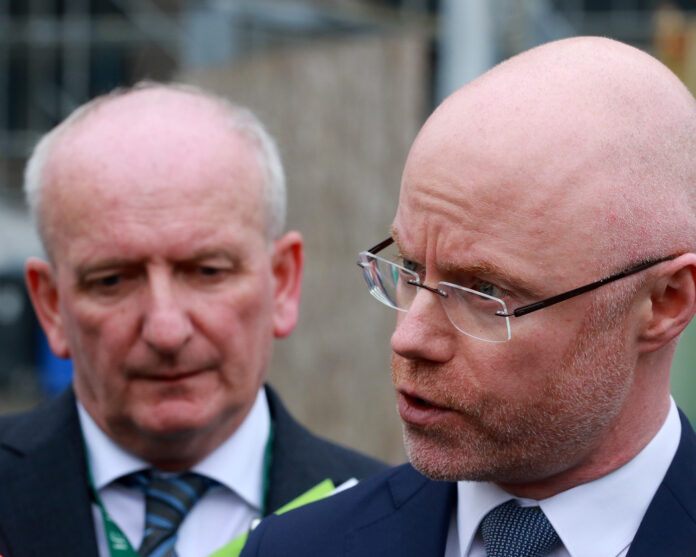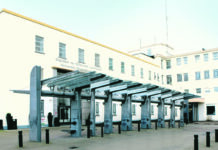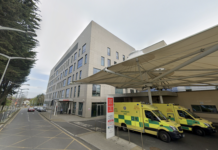
MINISTER for Health Stephen Donnelly said that tackling the trolley crisis at the persistently overcrowded University Hospital Limerick (UHL) will not happen unless consultants become more visible on the floor of the hospital’s overwhelmed emergency department and engage with management on the Public Only Consultant Contract (POCC).
In a crisis visit to UHL today (April 4), where chronic overcrowding has led to a number of patient deaths, Minster Donnelly said he met with “burnt out” nurses and doctors who said they needed more beds and more support from senior clinical decisionmakers onsite.
Mr Donnelly said an additional 86 beds, including 16 rapid-build beds at UHL, 50 step-down beds in Nenagh, and 20 community healthcare beds in Clare, would be provided ahead of an expected winter surge of patients to try to help alleviate pressure on patients and staff.
A 96-bed block presently under construction on the grounds of UHL is to open in 2025 and a second 96-bed block will also come on stream, however Minister Donnelly said UHL consultants needed to step up and make changes to their workplace practices.
“In order for this to work, we have to see reform in the hospital. Limerick has one the lowest uptakes of the new Public Only Consultant Contract, the level of weekend discharge is not where it needs to be,” he told reporters gathered at the hospital.
He acknowledged that many consultants are working night and day to help tackle patient flow, but said he expected more to be “rostered on site, in the emergency department and throughout the hospital, after hours and at weekends”.
“I’ve been very clear with the management team that what I, and the government, and the people in the region, now need to see is a step change in the leadership from the senior clinical community in this hospital so that we can drive down the trollies.”
Colette Cowan, chief executive of the UL Hospitals Group, told a regional health forum last week that only 28 per cent of emergency medicine consultants employed by the group had signed up to the POCC, which could see them being asked to work an extra five hours on Saturdays and an extra two hours on weekdays.
Mr Donnelly, who was accompanied at UHL by chief executive of the HSE Bernard Gloster, told reporters: “UHL ranks nineth in the country for weekend discharges, that must improve, and there will be a progression to immediate rostering over six and where contractually possible seven days.”
He said that an “all-of-hospital approach” to treating emergency department (ED) patients was required, which would include “the presence of non-ED consultants to support ED colleagues in the emergency department when necessary”.
The Health Minister said that while trolley numbers had reduced in other hospitals, in spite of increased patient presentations nationally, UHL remained a “significant outlier, as they have seen about the same increase in presentations, but rather than a fall in trolleys they have seen a 50 per cent increase “.
Protesters turn out
Members of the Mid West Hospital Campaign (MWHC) protested outside the hospital during the Health Minister’s visit, calling for the reopening of emergency departments in Nenagh, Ennis, and St John’s hospitals, which were closed and reconfigured to UHL in 2009.
Minister Donnelly conceded that reconfiguration had not worked as it was not properly resourced.
“It was not done properly, what should have happened here (at UHL) is this kind of investment should have happened first, so that this hospital had the capacity it needed to take on all those extra patients. That didn’t happen and that’s what we are now rectifying.”
When asked if he would consider reopening the regional EDs, the Health Minister said the latest advice he had received from HSE Chief Clinical Officer Dr Colm Henry was “that it would not be safe for patients to open emergency departments in those hospitals”.
However, with recent patient deaths at UHL under the spotlight and patients expressing fears of attending the hospital following its admitted failings in its care to some of its patients, Mr Donnelly acknowledged that “the current situation here (at UHL) is not tolerable and not acceptable”.
When asked if he was “satisfied with the quality of management at UHL”, he replied that he was “not going to comment on any individual” but that all at the hospital were working hard to provide the best care for patients.
‘Catalogued series of failures’
Mr Donnelly said he was “very concerned” at details of an unpublished internal report into the death of UHL patient Martin Abbott who, it was revealed last week at the Shannon man’s inquest, had been dead on the floor of the UHL ED for over an hour before staff noticed his body.
Mr Donnelly said the report “catalogued a series of failures” in Mr Abbott’s care and “also called out the fact that solutions to overcrowding which have worked in other hospitals have yet to be seen here (in UHL)”.
“What happened was not acceptable. It shouldn’t have happened,” he said.
“We need to make sure the healthcare professionals in this hospital have the supports they need and the patient flow they need in place to make sure that things like that don’t happen.”
HSE boss Bernard Gloster added that “there are several families for whom there is upset and distress about their experiences of healthcare in this region”.
Ongoing investigations
Mr Gloster said he expected that an ongoing investigation by former Chief Justice Frank Clarke into the death of 16-year-old UHL patient Aoife Johnston, who waited for care for sepsis for 12 hours on a trolley before her death from bacterial meningitis, would be completed in May.
“Regardless of any findings, we would never want those outcomes for people and we are exceptionally sorry that that has been their experience and that is what happened,” Mr Gloster said.
“Sometimes we can’t take away all of their pain, but what we can do, and what have been doing here for the past number of months, and the changes we have made with a new regional management system here also, we can continue to make improvements, and I think we can be humble enough to learn from the shortcomings that we’ve had.”
The HSE Chief warned that providing extra beds at UHL would “all come to nothing if equally we don’t change how we do our business over the seven days of the week”.
Minister Donnelly said the government had invested in extending medical assessment services at UHL and providing extra bed capacity, step down facilities, and a GP triage system would be introduced at the hospital in the coming weeks.
However, he said, the first of two 96-bed blocks will not be completed in time for the expected winter surge and no starting date has been provided for the second block.
The blocks must be adequately staffed before they are opened, he warned the HSE.
“What I don’t want to see is the handover of the beds and the commissioning of the (first) block and then we start looking for the staff, we need to start planning for that now, a year in advance.”
In response, Mr Gloster said he was confident it would be able to recruit enough staff to manage the additional bed capacity coming on stream.
The additional measures come on top of a 41 per cent increase in staff at UHL since 2019, 108 additional beds since 2020, and a 445 increase in its budgetary allocation to €383 million in 2023.










